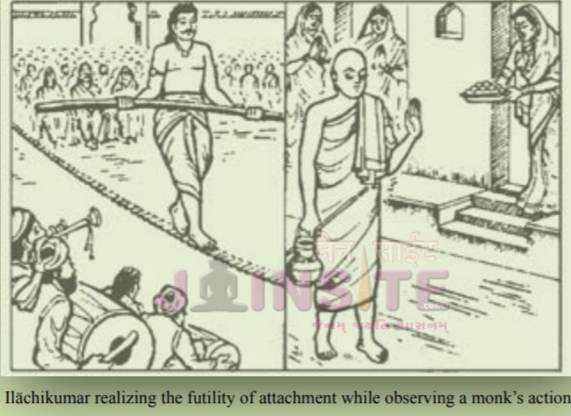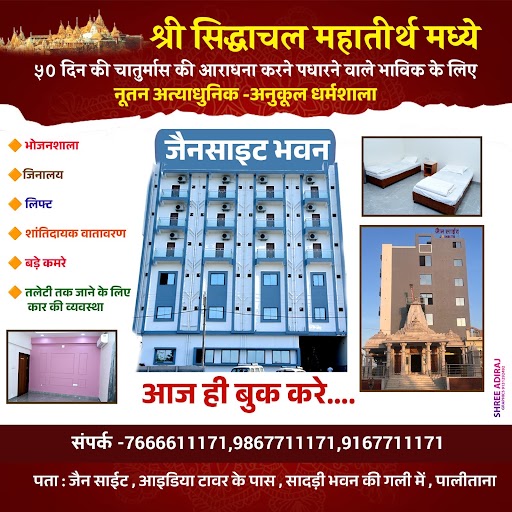Ilächikumär
In ancient times, there lived a wealthy businessman named Dhandatta in the town of Ilävardhan. His wife
Ilächi gave birth to a very lovable and handsome boy. Being the only son, the parents deliberately kept him nameless as was the custom in those days. As the son of Ilächi he came to be known as Ilächiputra. He was raised with loving care and attention and never lacked any luxuries. He grew up to be a handsome youth and was eventually known as Ilächikumär. His parents felt it was time to find a wife for him. They did not need to look very far. Since they were a prosperous family and Ilächikumär was their only son, many families wanted their daughters to marry him. His parents prepared a list of selected names and asked Ilächikumär to choose the one that he liked the most. However, Ilächikumär could not make a selection.
One day a party of acrobats came to Ilävardhan. In those days, there were no stadiums where acrobats could perform. They performed their skills for their audience on the open streets. Beating drums to announce their arrival, the acrobats planted poles in an open square off the main street and connected them with ropes. Many people assembled there to watch the show. The acrobats climbed the pole one after another and started demonstrating their skills by performing on the rope. They were walking and jumping over the high rope, fascinating the people with their performance. Attracted by the commotion, Ilächikumär also went to watch the show. While watching the performance of the acrobats, his attention was drawn to the young daughter of the chief acrobat. She was very beautiful and was dancing very gracefully to the tune of the drums with bells on her feet. Ilächikumär was so mesmerized by her beauty and charm that he could not take his eyes off her.
At the end of the show, the acrobats descended the rope and started collecting money from the people who had assembled for the show. People were very pleased with the performance and paid handsomely. After collecting a large amount of money, the acrobats left the square to camp for the night and everyone else went home. Ilächikumär also returned home. But his mind was still on the beautiful girl he had seen that day. At dinner, his parents found him silent and unresponsive to their efforts to converse with him. His parents had never seen him so dazed. His father questioned his absent-mindedness but he did not answer. After dinner when his mother persisted on the reason for his silence, he finally replied that his heart was attracted to the acrobat girl and he wanted to marry her.
His mother was taken aback to hear that. She said that she could find him a very beautiful and lovable girl from a high caste and respectable family and asked him to forget the lower caste acrobat girl. Ilächikumär replied that he had never met any other girl who attracted him and he wanted to marry that girl. Acknowledging his resolve on the matter, she told her husband about their son’s intentions. Dhandatta was shocked to hear this. He tried to dissuade his son from his intention but Ilächikumär remained firm. Dhandatta was a sensible man. He could see that Ilächikumär would not be at peace without that girl. He did not want to lose his son for the sake of prestige. He therefore called the chief of acrobats and requested him to give his daughter in marriage to Ilächikumär.
The acrobat refused because he was bound by the convention of his tribe. Dhandatta thought that he might be looking for money for the girl. He therefore offered to give as much wealth as the acrobat wanted for agreeing to marry his daughter to his son. The acrobat, however, declined the offer and replied that he could not break the convention. Dhandatta then asked him about his tribal convention. The acrobat said that he could give his daughter only to the person who could win an award from a royal court by pleasing the king with his acrobatic skill and would then give dinner to his community from the prize money. Dhandatta was disappointed to hear that because it was apparently impossible for his son to fulfill that condition. He explained to his wife what had happened. She called her son and said that the girl would only marry an expert acrobat and asked him to forget her.
Ilächikumär was silent but his mind was racing with thoughts. He felt that he would not be able to live happily without the girl and was willing to make any sacrifice for her. He was even prepared to learn acrobatic skills for that purpose. His parents misunderstood his silence as disappointment and felt that in time he would recover. They tried to divert his attention to other matters to help him forget and Ilächikumär allowed them to believe that they were succeeding. But his mind was made up. When the acrobat group decided to leave the town of Ilävardhan, Ilächikumär secretly left his home and joined the acrobat group.
He discarded his fancy clothes and put on an acrobat’s uniform. He started learning their skill. He was smart and diligently learned the acrobatic skills. The girl fell in love with him and helped him to learn the skills. With her help he easily mastered the skill and soon became an expert acrobat. When the group reached the city of Benätat, he requested the father of the girl to organize a show at the royal court. Thereafter, the chief went to the young king and requested him to watch the performance of the young acrobat and to award him a suitable prize for his skills.
The king agreed and the acrobats erected the poles in the compound of the royal palace where the officers of the state and the elite of the city were invited to watch the performance. The king occupied
his seat in the balcony of the palace. Bowing to him, Ilächikumär went over the pole. Jumping onto the rope he started displaying his acrobatic skills. He walked on the rope with ease and grace. He also performed risky jumps and somersaults. It was a superb performance. No one had ever seen such acrobatic feats. Everyone was highly impressed with his skill. Ilächikumär felt gratified by the appreciation of the people. He thought that it was enough to please the king as well. He came down, and bowed to the king again and requested an appropriate award.
During the performance, however, the king’s attention had been diverted by the beautiful girl. She fascinated him. He saw how she gazed lovingly at Ilächikumär throughout the performance. He thought that he could easily gain her if he somehow got rid of Ilächikumär. The chief acrobat approached the king and asked if he had enjoyed the performance. The king pretended that his mind had been occupied with problems of the state and he was not able to give his full attention to the performance. He requested Ilächikumär to show his skill again. Accordingly, Ilächikumär got on the rope again and displayed his skills. At the end of the show, the king pretended to be drowsy and asked him to repeat the performance. Ilächikumär could not believe it. He suspected that there was something wrong. However, since he was still eager to accomplish his cherished goal of marrying the girl, he decided to try again.
He started the ropewalk once again. He triumphantly looked around. While up there, he noticed a beautiful woman offering sweet food to a young monk. She was in the prime of her youth and was very attractive and highly graceful. What surprised Ilächikumär was that the monk was completely unaffected by her beauty. He compared it to his own situation. He had changed his entire life for the beauty of one girl and the monk was impervious to the lovely woman in front of him. He was amazed by the self-control and detached attitude of the monk towards the beautiful woman. What power kept the monk aloof in the presence of that woman? In addition, while remaining aloof, peace radiated from his face! This detachment of the monk raised a succession of thoughts in the mind of Ilächikumär.
“Why do I not feel detachment in the presence of a beautiful young girl?” He also wondered why the young king had asked him to repeat his performances. He suspected that the king must be attracted to the girl and must be waiting for him to fall from the rope. “If I fall from the rope, I would be badly hurt and would not be able to perform acrobatic feats. In that case I will never be able to marry the girl for whom I have abandoned my home and my parents.” He realized that the happiness he was looking for was an illusion. He began to recall his early religious training when he had been exposed to religious principles. He had learned about the soul within the body and its immense capabilities. He realized that his achievements as an acrobat must have been due to that inner capability. The monk could remain unaffected because he remained tuned to his soul and stayed vigilant about the pitfalls. “As an acrobat I have to remain constantly vigilant because the slightest unawareness on my part can result in a fall from the high rope and possibly in my death. Why then should I not use the same vigilance for the sake of spiritual upliftment?”

Ilachikumar realizing the futility


